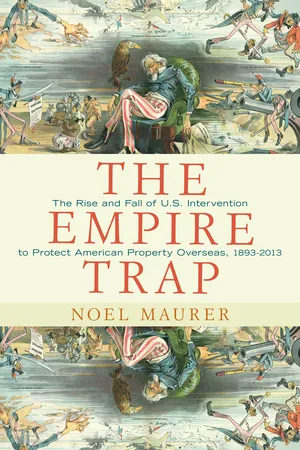
The Empire Trap
The Rise and Fall of U.S. Intervention to Protect American Property Overseas, 1893-2013
- 568 pages
- English
- ePUB (mobile friendly)
- Available on iOS & Android
The Empire Trap
The Rise and Fall of U.S. Intervention to Protect American Property Overseas, 1893-2013
About this book
How the United States became an imperial power by bowing to pressure to defend its citizens' overseas investments
Throughout the twentieth century, the U.S. government willingly deployed power, hard and soft, to protect American investments all around the globe. Why did the United States get into the business of defending its citizens' property rights abroad? The Empire Trap looks at how modern U.S. involvement in the empire business began, how American foreign policy became increasingly tied to the sway of private financial interests, and how postwar administrations finally extricated the United States from economic interventionism, even though the government had the will and power to continue.
Noel Maurer examines the ways that American investors initially influenced their government to intercede to protect investments in locations such as Central America and the Caribbean. Costs were small—at least at the outset—but with each incremental step, American policy became increasingly entangled with the goals of those they were backing, making disengagement more difficult. Maurer discusses how, all the way through the 1970s, the United States not only failed to resist pressure to defend American investments, but also remained unsuccessful at altering internal institutions of other countries in order to make property rights secure in the absence of active American involvement. Foreign nations expropriated American investments, but in almost every case the U.S. government's employment of economic sanctions or covert action obtained market value or more in compensation—despite the growing strategic risks. The advent of institutions focusing on international arbitration finally gave the executive branch a credible political excuse not to act. Maurer cautions that these institutions are now under strain and that a collapse might open the empire trap once more.
With shrewd and timely analysis, this book considers American patterns of foreign intervention and the nation's changing role as an imperial power.
Frequently asked questions
- Essential is ideal for learners and professionals who enjoy exploring a wide range of subjects. Access the Essential Library with 800,000+ trusted titles and best-sellers across business, personal growth, and the humanities. Includes unlimited reading time and Standard Read Aloud voice.
- Complete: Perfect for advanced learners and researchers needing full, unrestricted access. Unlock 1.4M+ books across hundreds of subjects, including academic and specialized titles. The Complete Plan also includes advanced features like Premium Read Aloud and Research Assistant.
Please note we cannot support devices running on iOS 13 and Android 7 or earlier. Learn more about using the app.
Information
Table of contents
- Cover
- Title Page
- Copyright Page
- Contents
- Acknowledgments
- One Introduction
- Two Avoiding the Trap
- Three Setting the Trap
- Four The Trap Closes
- Five Banana Republicanism
- Six Escaping by Accident
- Seven Falling Back In
- Eight The Empire Trap and the Cold War
- Nine The Success of the Empire Trap
- Ten Escaping by Design?
- Eleven The Empire Trap in the Twenty-first Century
- Notes
- Index